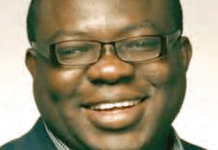In recent years, the fight against malaria has become much easier for primary healthcare providers in developing countries – unlike the days of old when lack of adequate diagnostic equipment (mainly due to financial constraints) was an agonising challenge. And you don’t need to look too far to know what has changed. It’s all in the Urine Malaria Test (UMT) kit, the ground-breaking device developed by Dr Eddy Agbo.
Agbo is a Nigerian-born biomedical scientist and the founder of Fyodor Biotechnologies, based in USA. His revolutionary medical device, which can be used to test if a patient has malaria within 25 minutes, has attracted both local and international attention because of the enormous impact it is making in healthcare systems around the world.

Background to breakthrough
Malaria, the most deadly parasitic disease in the world affects more than 40 per cent of the world’s total population, especially people living in areas where the parasite is endemic. According to the World Malaria Report, released by WHO, in 2017, 90 per cent of malaria cases in 2016 occurred in Sub-Saharan Africa. That same year, there was an estimated 216 million malaria cases and an estimated 445,000 of malaria deaths globally.
Aside from the high mortality rate, malaria has also had a devastating effect on productivity in Sub-Saharan Africa. The disease costs the region up to $12 billion in trade, foreign investment and tourism.
Early diagnosis and treatment of malaria reduces disease transmission and prevents deaths. The WHO recommends that all suspected malaria cases be confirmed, using either microscopy or rapid diagnostic test before treatment is administered. However, this recommendation remains unattainable in primary care facilities in rural areas in many developing countries where poor health infrastructures limit the use of the standard microscopy testing. In urban areas where adequate health facilities are available, many people are reluctant to go for testing because of the cost implication of going to the hospital and getting laboratory tests, or the inconvenience of waiting for many hours at public hospitals to get affordable care.
This is why the UMT device has proved to be a game-changer, as it enables people to easily, affordably and conveniently diagnose themselves at home before commencing treatment.
How it Works
The Fyodor UMT kit is a rapid diagnostic device that uses dipstick technology, just like the manual pregnancy test kit. It carries out an in vitro test of malaria parasite in a simple one-step procedure with no need for blood samples, reagents or complex equipment. The UMT detects proteins the malaria parasite sheds in the urine of a patient with Malaria fever.
Inventor’s profile
Dr Agbo grew up in a small village called Mbu in southeast Nigeria. He studied Veterinary Medicine at the University of Ibadan, where he obtained his Doctor of Veterinary Medicine degree. He holds a Master of Science in Biotechnology from Wageningen University and a PhD in Molecular Genetics from Utrecht University, both in the Netherlands. He also has a Graduate Certificate in “Leadership and Management in the Life Sciences” from Johns Hopkins University Business School, USA.
The erudite scientist has held university positions at Utrecht University, Wageningen University and Vrije Universiteit, Amsterdam, Netherlands, where he did biomedical research for many years. Agbo moved to the USA to work for the Johns Hopkins University. He was a Research Fellow at Johns Hopkins University School of Medicine. He left John Hopkins to work for Cangen Biotechnologies, a cancer therapeutics and diagnostics, in Baltimore. There he worked has a senior director for research and preclinical development and as a chief technical lead researcher.
Agbo is currently the Chairman/CEO of Fyodor Biotechnologies Corp USA and Fyodor Biotechnologies Nigeria Ltd., a firm he founded in 2008. Since its establishment, the firm has produced ground-breaking healthcare solutions, including the popular Urine Malaria Test kit.
Awards and recognitions
Dr Agbo has won numerous awards, including the “Outstanding Innovator of the Year” award from the US Corporate Council on Africa, and the “Innovation Award” from the Private Health Sector Alliance of Nigeria, among others. He has been a guest speaker at various forums, including the White House/US Department of State Bio-economy Conference, Washington DC; World Healthcare Congress; Corporate Council on Africa; US-Africa Private Sector Health Conference, Nigeria Business Summit, among others.
He served as a member of Maryland Life Sciences Advisory Board that oversees a $1.3B fund established by the state to advance biotechnology, appointed by Governor Martin O’Malley of the State of Maryland USA.
In 2015, the UMT kit won the inaugural Health Innovation Challenge Awards in Nigeria, backed by the Private Sector Health Alliance of Nigeria (PHN). The award comes with a grant of $100,000 and support from backers, including Bill Gates, Aliko Dangote, and former Nigerian president, Goodluck Jonathan.
Dr Agbo’s ingenuity and innovative solution is a major milestone in the war against malaria and has transformed the way healthcare systems in developing countries combat the disease. Indeed, the extraordinary impact of the UMT kit shows that Africans are in the best position to address their current and future challenges if they look inwards to develop innovative solutions to their problems.











Keep it up, Dr Eddy Agbo you are a blessing to Nigeria , Africa and the whole world in general , more grace n knowledge.